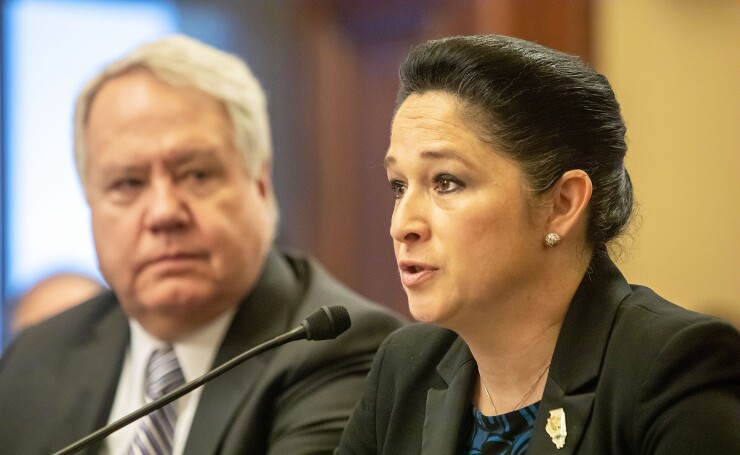When Illinois Comptroller Susana Mendoza this month launched a new online portal to track state spending on asylum seekers, state residents gained a window onto a major piece of the local government spending pie, with the city of Chicago and Cook County also spending millions on the migrant crisis.
As of Feb. 27,
“We can’t wait for the federal government,” Mendoza told The Bond Buyer. “You can’t have children die of hypothermia on your watch… We’re not going to have people freeze to death out there and we certainly don’t want to see more children die. But we don’t want to let the federal government off the hook.”
Office of the Illinois Comptroller
Two children have died in Illinois as a result of Texas Gov. Greg Abbott’s decision to send busloads of migrants to Chicago and surrounding towns. In August 2023, a
More than 30,800 migrants have arrived in the Chicago area since August 2022, the Texas governor said in a
Mendoza argued that “it’s cruel to send people here during the very coldest months of the year,” but she also acknowledged that the illegal immigration issue “has been completely politicized” and “it’s a very real issue for Texas and Arizona.”
“It should not fall upon states, who already have very lean budgets and can’t print money, to bear the costs of this,” she added. “We’re fronting the money, is how we should be thinking about this… I hope that our portal can essentially serve as a receipt to the federal government.”
Earlier this month, a bipartisan immigration compromise failed in the Senate after its
Shortly thereafter, rating agencies started to voice reservations about Chicago’s ability to cope with the migrant influx. On Feb. 13, S&P Global Ratings
“How the city manages these pressures, particularly when faced with high costs for its underfunded pension programs, could have a longer-term effect on its credit quality,” the S&P analysts wrote.
And on Feb. 22, S&P
Fitch Ratings already assigns Chicago
“We anticipate significant funding is going to be outlaid” on the migrant crisis, Mendoza said. “I think the best way to have accountability is to be financially aware. Even with household budgets, if you’re not seeing the outputs, it becomes so much easier to spend beyond your means.”
The blueprint for the new asylum seekers portal was the
“When I saw that, I thought, ‘Oh good God, this had better not happen at the state level,'” she said. “It shouldn’t take the press to FOIA these things, we should put them out there ourselves. The best way to prevent an egregious misuse of money like this is to show people that we’re spending it as best as possible.”
Mendoza hopes Chicago and Cook County will roll out their own spending trackers, she said, because among other things, telling the story of how each dollar is spent gives them the chance to go back to the federal government later and ask to be reimbursed. It also staunches distrust in government, as she saw amid all the COVID-19 spending.
“Even in the darkest days of the COVID pandemic, we never sacrificed transparency,” she said. “And transparency is important because it breeds accountability… When I took office, I took on a $17 billion backlog of unpaid bills. We were well on our way to paying back that backlog of unpaid bills when the pandemic hit… I tell people, you can track how everything was spent. We’re super transparent. We want to make sure that we never give people the opportunity to create their own set of facts.”
It’s the people’s money, she added, and the costs of a humanitarian crisis shouldn’t break state and local governments’ budgets and credit ratings.
“We want our money back from the federal government,” Mendoza said. “There’s a lot of distrust in government. I can only do my part; even if it takes some time, we can restore people’s trust.”
